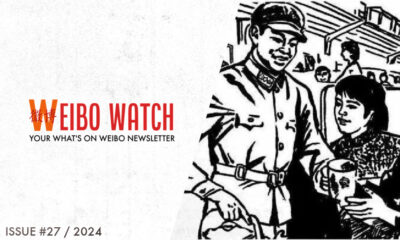China Society
Beyond Climate Change Concerns: Fukushima Fear and Eco-Anxiety in China
“Is our world turning into an apocalyptic survival game?” Fears over Fukushima waste water and other global threats are fueling public anxiety in China.
Published
8 months agoon

While there isn’t a heated ongoing debate about global warming and climate change in China, it doesn’t imply that people are apathetic about the environment and well-being of future generations. Public expressions of ‘eco-anxiety’ and fears for the future are channeled towards different topics in China, where some believe that recent global challenges have transformed their lives into an ‘apocalyptic survival game.’
Over the past ten days, Japan’s decision to release treated nuclear water has ignited waves of anger and concern on Chinese social media platforms. Many netizens express worries about how the Fukushima wastewater might impact the marine ecosystem, while others are deeply concerned about the long-term repercussions of this pollution on their food safety and overall well-being in the coming decades.
The huge public concern over the Fukushima water seemingly poses a stark contrast with that over climate change. As Miranda Barnes recently noted in our Weibo Watch newsletter, the urgent implications of climate change and global warming caused by human activities are a huge topic of debate in Western countries, especially in relation to extreme weather. In China however, the phenomenon of “eco-anxiety” doesn’t resonate among the public in the same manner as it does in Western discourse, despite notable events like China recording historically high temperatures in July, the impact of Typhoon Doksuri, last summer’s wildfires and this summer’s devastating floods.
In a recent Reuters article about the discussions surrounding climate change in China, a Greenpeace senior adviser called it a “big missed opportunity” that Chinese state media and official channels did not connect the recent extreme weather in the country to its own carbon emissions and climate change at large.
China’s limited engagement with the climate change discourse is also noticeable in the realm of social media. Researchers Chuxuan Liu and Jeremy Lee Wallace published a study about “China’s missing climate change debate” (2023), concluding that social media site Weibo does not have very active discussions about the topic of climate change at all. They found that only 0.12% of the unique trending topics on Weibo from June 2017 to February 2021 were related to this theme.
Some news articles suggest that the lack of climate crisis discussions in China relates to the challenges faced by grass-roots environmental movements in contemporary China, alongside censorship.
But climate anxiety is not the only form of eco-anxiety, and it would be a misconception to assume that absence of panic over climate issues means that Chinese people are not concerned about the environment or the well-being of future generations at all. As explained in Eco-Anxiety and Pandemic Distress, various global threats, including climate change, ecological challenges, and pandemics, are interconnected in multiple ways. Pandemics can influence ecological problems, for example, and ecological dynamics and climate factors can also cause outbreaks and shape pandemics (Pihkala 2023, 1).
Climate change, global warming, and environmental activism may not hold as prominent a place in daily social life and online media in China as in the West, but some topics related to global ecological challenges — often communicated by state media and amplified by public responses — actually garner more engagement than in Western countries.
We delve into a few examples in this article. Given the scope of our discussion, we won’t go into the scientific details behind these phenomena; instead, we’ll center our attention on the public anxiety surrounding them.
Public Panic over Fukushima
Japan’s decision to start discharging treated nuclear water into the Pacific has already become one of the biggest topics on Chinese social media this year. Through Weibo posts, short videos, articles, and memes, people vociferously criticized Japan for what they saw as an irresponsible act of releasing “contaminated water” (污染水) – a concept popularized by official channels highlighting the toxicity of the disposed water, as opposed to the more neutral “treated water” (废水) term.
In the first days surrounding the Fukushima waste water release, a trending topic on Chinese social media highlighted how the move would harm to the oceanic ecosystem, with many people posting photos of dolphins, sealions, whales, fish, and other wildlife that could be affected by water pollution alongside the hashtag “History Won’t Forget.”
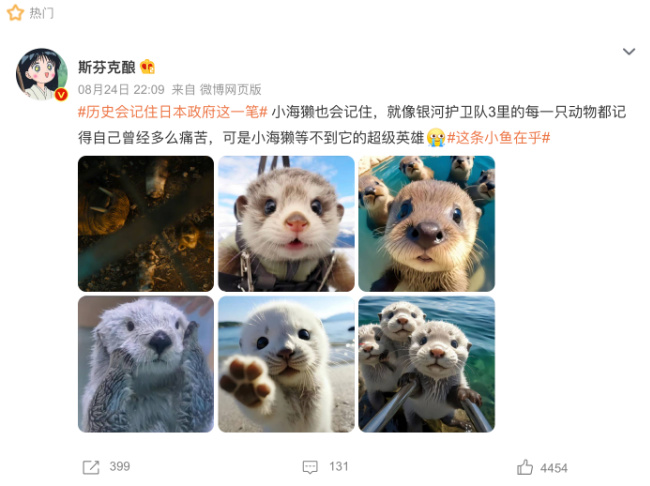
This post claimed that “the sea otters will also remember” what Japan has done.
In addition to a surge in anti-Japanese sentiments and concerns about the livelihoods of the Chinese fishing industry, another significant aspect of the viral online responses to the Fukushima wastewater issue has been the discussions regarding strategies for how to survive the perceived crisis.
While in the English-language media sphere, critics dismissed the panic as unwarranted, stressing that the disposal is well within safety limits or that environmental impact is negligible, the release of the treated water caused an outbreak of apocalyptic fears and many people immediately took action to protect themselves and their loved ones in various ways.
These fears are widespread, encompassing notions such as the contaminated water having the potential to induce mutations in marine life and elevate the risk of cancer when consumed by humans.
On the day preceding the wastewater release, Chinese state media outlet China Daily launched a hashtag about how “the nuclear-treated water will reach our seashore in 240 days” (#核废水排放后240天就会到达我国沿岸海域#). This statement was based on a Tsinghua University simulation study into how the tritium will spread.
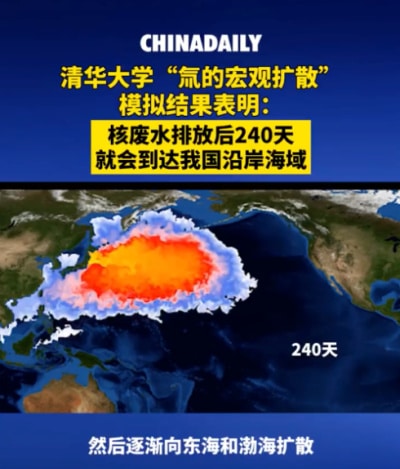
A screenshot from the video posted by the Weibo account of China Daily about the simulation study, showing that the water will reach China’s seashore after 240 days.
The idea that the contaminated water discharged into the Pacific could reach China within less than eight months quickly gained traction on social media platforms, with many netizens reposting and highlighting the timeline, even planning their “last activities” within these days, such as consuming China-produced seafood or visiting the beach.
Rumors suggesting that the released water would reach the United States long after affecting China and nearby countries also gained widespread online popularity. Some of these analyses led to suspicions that the release of treated water must be a joint conspiracy by Japan and the United States, with the specific aim of targeting the lives of Chinese people.
Guidelines on how everyday practices could mitigate radioactive harm widely circulated. These included recommendations such as taking showers after it rains, identifying makeup products free from radioactive elements, or transitioning to a more vegetarian-based diet. Many of these tips, however, have no scientific basis. One restaurant in Shanghai even started offering anti-radioactive menus.
Meanwhile people began hoarding supplies in preparation for long-term survival. In the coastal city of Weihai, the closest Chinese city to South Korea, four tons of salt were sold in just one hour as citizens queued to stockpile salt on August 24. The salt frenzy stems from collective concerns about the impact of Fukushima water on food safety and that table salt – in the near future and in the decades to come – might also become compromised. There’s also a believe that salt might help in case of radiation pollution (iodized salt, however, is actually no antidote for radiation).
Although muck of the panic buying may have evoked memories of the past Covid years and preparations for the potential next lockdown, people actually also started hoarding salt back in 2011 shortly after the nuclear accident at Fukushima Daiichi in March of that year.
Russia’s Anthrax Outbreak
Similar to the Fukushima wastewater responses, the same question of “how long does it take to arrive in China” also frequently pops up in the discussions surrounding the spread of anthrax in Russia. Anthrax is a serious infectious disease that occurs naturally in soil and can cause severe diseases to both humans and animals.
While Western media mostly focused on the Prigozhin jet crash incident, news of a mysterious anthrax outbreak in Russia (#俄罗斯一地暴发细菌性炭疽病#) has garnered attention on Chinese social media, causing significant concern. A current hypothesis directly connects climate change and the outbreak by suggesting that the thawing of frozen soil might have exposed people to decades-old infected reindeer carcasses.
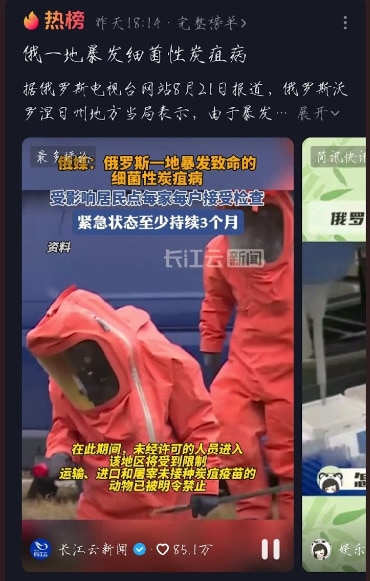
A screenshot of the search result on Wechat channels on the topic of Russia’s anthrax, which shows that one related videos received 851,000 likes. Image shared by a netizen on Weibo.
In the comments under reports about the anthrax outbreak, many people are curious about how close the outbreak is to China’s borders. Others are researching anthrax transmission and fatality rates, wondering if it could turn into another global pandemic.
While most people are concerned about the outbreak’s potential impact, some are politicizing it without clear evidence, accusing the US of engaging in new “biological warfare” in Russia.

An image of the game “Resident Evil: Death Island” from a game review article.
The unease about Russia’s anthrax outbreak possibly being linked to “biological warfare” aligns with the public’s anxiety about mutations caused by Japan’s release of radioactive water. These worries amplify existing concerns about environmental changes, drawing parallels with the dystopian world of the Japanese survival horror game “Resident Evil,” where players face environments filled with zombies and other terrifying creatures. In discussions about the anthrax situation, a recurring question emerges: “Why does our reality increasingly resemble an apocalyptic survival game?”
Covid-19 Subvariants and Monkeypox
Apocalyptic game survival always becomes challenging when there are more than two crises unfolding at the same time. Beyond the concerns about contaminated water and anthrax outbreaks, another issue has captured the attention of the Chinese public recently – the spread of the latest Covid-19 subvariants, EG.5 and BA.2.86.
EG.5 is now the most prevalent in the US and has been detected in at least 52 countries. BA.2.86 is much less widespread, but scientists are alarmed by how many mutations it carries.
While more Chinese social media users are sharing their own experiences of getting Covid a third time, people begin to worry about the possible impact of a massive Covid-19 third wave, referred to as sān yáng (三阳). At the same time, some accounts are giving daily updates on new global cases of BA.2.86, and news reports related to new Covid sub-variants ignite strong reactions from netizens.
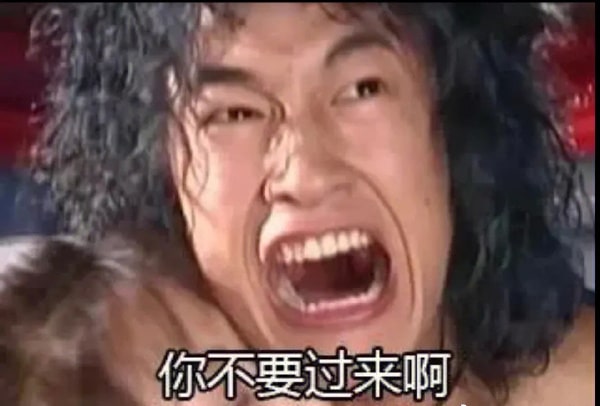
“Do not come over” meme used during the monkeypox outbreak.
We have seen similar responses related to news about monkeypox (mpox), with one domestic case of monkeypox occurring in July of this year becoming a top trending topic. Soon after, China saw the world’s fastest increase in cases of mpox, leading to significant concerns expressed by many, with people seeking information on preventive measures to avoid contracting the virus and expressing their hopes that the virus will remain far away from them.
Apocalyptic Games
“The main task is to stay alive”, concluded numerous netizens on Weibo after listing recent hashtags related to nuclear water, anthrax, and the next Covid-19 subvariant in their posts.
The combination of recent crises involving the environment and public health has made the prospect of impending catastrophe feel distressingly real to many. Half-jokingly, young people on Weibo express their concerns about having shorter lifespans. One netizen even humorously remarks, “Paying into your pension plan under these circumstances is almost like a form of romantic heroism,” suggesting that maintaining the belief that one will live long enough to enjoy their pension is overly optimistic and somewhat naive, especially in the face of present-day global challenges.
Beyond concerns about pension plans, a reluctance to have children has also emerged as a common sentiment, especially after Japan’s release of nuclear treated water. A viral screenshot of a street interview in Hong Kong captures the essence of this sentiment. In the interview, a young person nonchalantly responds that he isn’t worried about contamination of Japanese seafood because he doesn’t plan to have children. While not everyone shares this carefree attitude, many agree that having children in the current climate would be risky and senseless given the state of the world today.
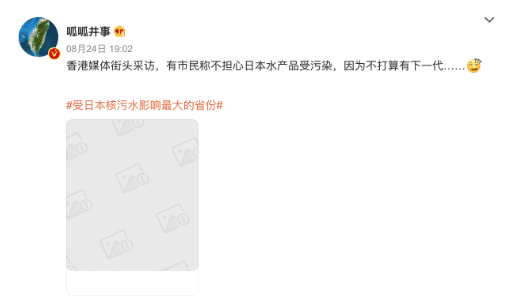
A Weibo user sharing the screenshot of the interview on Weibo and comment that “[This is from] a street interview in Hong Kong. Some citizens said they did not worry about the contamination of Japanese seafood because they did not plan to have children.” The screenshot has now been censored.
Some netizens humorously assume the roles of players in an apocalyptic survival game, assigning different tasks to themselves.
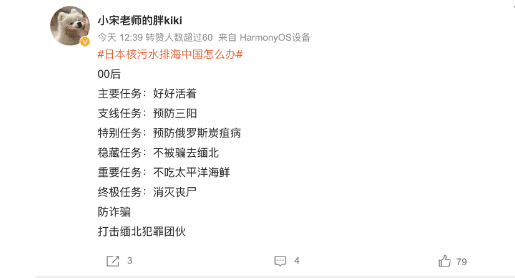
A Weibo user sharing their “tasks” in the survival game.
Under the hashtag ‘What China Can Do When Japan Releases Contaminated Water in the Ocean’ (#日本核污水排海中国怎么办#), one netizen outlines tasks for ‘players’ based on priorities: “Primary task: stay alive; Side-quest: prevent a third-time Covid-19 infection; Special Task: prevent Russia’s anthrax; Hidden task: avoid being deceived by North Myanmar; Important task: avoid consuming seafood from the Pacific Ocean; Final task: eliminate zombies.” Similar tasks have been listed in other posts, reflecting the sentiment that a mass extinction event is looming, making survival increasingly challenging.
Eco-Anxiety and a Bleak Future
While the term ‘eco-anxiety’ is familiar in Western societies and used by environmental activists, it has yet to become popular among the general public in mainland China, and there is no widely recognized Chinese translation for it. However, this doesn’t mean that only vocal activists are concerned about ecological disasters, or that ordinary people in China are indifferent to global challenges because their concerns are not framed in terms of climate change or expressed through activism.
As numerous studies have shown, ecological anxiety is not exclusive to the West. It’s just that the Western language and framework may have captured this mentality first, making it easy to overlook individuals in other regions who share the same sentiments but express them differently.
Certainly, as elsewhere, mainstream national media in China also contribute significantly to events and incidents that fuel “eco-anxiety” among the public. Moreover, changing political narratives play a pivotal role in shaping these dynamics.
In contrast to the West, Chinese media doesn’t necessarily connect global warming to the nation’s carbon emissions. A recent article published by The Economist discussed official and public discussions being “inward-looking” and avoiding direct engagement with climate change debates.
However, as recently pointed out by Miranda Barnes in our newsletter, additional factors contribute to the distinct responses of Chinese netizens, particularly regarding personal consumption and how individual behavior is connected to climate change. With many people, especially elderly, feeling they bear no responsibility for major pollution or gas emissions, “extreme weather” (“极端天气”) topics on on Chinese social media mostly center around personal safety, self-rescue strategies, and considerations for insurance rather than the collective responsibility of humanity for causing climate change.
Complicating matters further, the presence of low social trust and public skepticism towards official media exacerbates eco-anxiety and other concerns about well-being and the future. People often believe that prioritizing individual self-help and self-protection is the safer option, leading to behaviors like panic buying, even when official sources advise against hoarding.
It is also noteworthy that many of the topics that people are concerned about when it comes to eco-anxiety and public health scares are linked, either directly or indirectly, to foreign countries. While several socio-historical factors contribute to these fears, there are critics who argue that Chinese leaders might exploit public sentiment against Japan or the US to deflect attention from their own internal economic, ecological, and political challenges. On the other hand, some Chinese commentators interpret the Western world’s apparent indifference to these issues as a prioritization of political strategies and capitalist profits over ecological concerns.

A cartoon posted on Weibo showing the US creating a samurai sword for Japan to fight with, mocking the US’s supportive attitude in Japan’s release of treated water.
Eco-anxiety is a collective response to various interconnected issues, including pandemics, disease spread, food security, environmental disasters, and the well-being of future generations. It’s like a complex puzzle where many pieces are intertwined, often involving intricate geopolitical and domestic political dimensions.
After the recent Fukushima fears, one person wrote on Weibo: “A while ago when listening to the BBC, I first heard the English term ‘eco-anxiety’ and I originally did not understand at all, why would people suffer from ‘eco-anxiety’? I hadn’t seen anyone around me with such emotions. But I get it now. I’m already deeply anxious myself.”
By Zilan Qian and Manya Koetse, with contributions by Miranda Barnes
Follow @whatsonweibo
References:
Liu, Chuxuan and Jeremy Wallace. 2023. “What’s Not Trending on Weibo: China’s Missing Climate Change Discourse.” Environmental Research Communications 5 (1).
Pihkala, Panu. 2023. “Introduction” In: Eco-Anxiety and Pandemic Distress. Edited by: Douglas A. Vakoch and Sam Mickey, Oxford University Press.
Get the story behind the hashtag. Subscribe to What’s on Weibo here to receive our newsletter and get access to our latest articles:
Spotted a mistake or want to add something? Please let us know in comments below or email us. First-time commenters, please be patient – we will have to manually approve your comment before it appears.
©2023 Whatsonweibo. All rights reserved. Do not reproduce our content without permission – you can contact us at info@whatsonweibo.com.
Stories that are authored by the What's on Weibo Team are the stories that multiple authors contributed to. Please check the names at the end of the articles to see who the authors are.

Also Read
China Insight
The Tragic Story of “Fat Cat”: How a Chinese Gamer’s Suicide Went Viral
The story of ‘Fat Cat’ has become a hot topic in China, sparking widespread sympathy and discussions online.
Published
3 days agoon
May 9, 2024
The tragic story behind the recent suicide of a 21-year-old Chinese gamer nicknamed ‘Fat Cat’ has become a major topic of discussion on Chinese social media, touching upon broader societal issues from unfair gender dynamics to businesses taking advantage of grieving internet users.
The story of a 21-year-old Chinese gamer from Hunan who committed suicide has gone completely viral on Weibo and beyond this week, generating many discussions.
In late April of this year, the young man nicknamed ‘Fat Cat’ (胖猫 Pàng Māo, literally fat or chubby cat), tragically ended his life by jumping into the river near the Chongqing Yangtze River Bridge (重庆长江大桥) following a breakup with his girlfriend. By now, the incident has come to be known as the “Fat Cat Jumping Into the River Incident” (胖猫跳江事件).
News of his suicide soon made its rounds on the internet, and some bloggers started looking into what was behind the story. The man’s sister also spoke out through online channels, and numerous chat records between the young man and his girlfriend emerged online.
One aspect of his story that gained traction in early May is the revelation that the man had invested all his resources into the relationship. Allegedly, he made significant financial sacrifices, giving his girlfriend over 510,000 RMB (approximately 71,000 USD) throughout their relationship, in a time frame of two years.
When his girlfriend ended the relationship, despite all of his efforts, he was devastated and took his own life.
The story was picked up by various Chinese media outlets, and prominent social and political commentator Hu Xijin also wrote a post about Fat Cat, stating the sad story had made him tear up.
As the news spread, it sparked a multitude of hashtags on Weibo, with thousands of netizens pouring out their thoughts and emotions in response to the story.
Playing Games for Love
The main part of this story that is triggering online discussions is how ‘Fat Cat,’ a young man who possessed virtually nothing, managed to provide his girlfriend, who was six years older, with such a significant amount of money – and why he was willing to sacrifice so much in order to do so.
The young man reportedly was able to make money by playing video games, specifically by being a so-called ‘booster’ by playing with others and helping them get to a higher level in multiplayer online battle games.
According to his sister, he started working as a ‘professional’ video gamer as a means of generating money to satisfy his girlfriend, who allegedly always demanded more.
He registered a total of 36 accounts to receive orders to play online games, making 20 yuan per game (about $2.80). Because this consumed all of his time, he barely went out anymore and his social life was dead.
In order to save more money, he tried to keep his own expenses as low as possible, and would only get takeout food for himself for no more than 10 yuan ($1,4). His online avatar was an image of a cat saying “I don’t want to eat vegetables, I want to eat McDonald’s.”

The woman in question who he made so many sacrifices for is named Tan Zhu (谭竹), and she soon became the topic of public scrutiny. In one screenshot of a chat conversation between Tan and her boyfriend that leaked online, she claimed she needed money for various things. The two had agreed to get married later in this year.
Despite of this, she still broke up with him, driving him to jump off the bridge after transferring his remaining 66,000 RMB (9135 USD) to Tan Zhu.
As the story fermented online, Tan Zhu also shared her side of the story. She claimed that she had met ‘Fat Cat’ over two years ago through online gaming and had started a long distance relationship with him. They had actually only met up twice before he moved to Chongqing. She emphasized that financial gain was never a motivating factor in their relationship.
Tan additionally asserted that she had previously repaid 130,000 RMB (18,000 USD) to him and that they had reached a settlement agreement shortly before his tragic death.
Ordering Take-Out to Mourn Fat Cat
– “I hope you rest in peace.”
– “Little fat cat, I hope you’ll be less foolish in your next life.”
– “In your next life, love yourself first.”
These are just a few of the messages left by netizens on notes attached to takeout food deliveries near the Chongqing Yangtze River Bridge.
As Fat Cat’s story stirred up significant online discussion, with many expressing sympathy for the young man who rarely indulged in spending on food and drinks, some internet users took the step of ordering McDonalds and other food delivery services to the bridge, where he tragically jumped from, in his honor.
This soon snowballed into more people ordering food and drinks to the bridge, resulting in a constant flow of delivery staff and a pile-up of take-out bags.

Delivery food on the bridge, photo via Weibo.
However, as the food delivery efforts picked up pace, it came to light that some of the deliveries ordered and paid for were either empty or contained something different; certain restaurants, aware of the collective effort to honor the young man, deliberately left the food boxes empty or substituted sodas or tea with tap water.

At least five restaurants were caught not delivering the actual orders. Chinese bubble tea shop ChaPanda was exposed for substituting water for milk tea in their cups. On May 3rd, ChaPanda responded that they had fired the responsible employee.
Another store, the Zhu Xiaoxiao Luosifen (朱小小螺蛳粉), responded on that they had temporarily closed the shop in question to deal with the issue. Chinese fast food chain NewYobo (牛约堡) also acknowledged that at least twenty orders they received were incomplete.
Fast food company Wallace (华莱士) responded to the controversy by stating they had dismissed the employees involved. Mixue Ice Cream & Tea (蜜雪冰城) issued an apology and temporarily closed one of their stores implicated in delivering empty orders.
In the midst of all the controversy, Fat Cat’s sister asked internet users to refrain from ordering take-out food as a means of mourning and honoring her brother.
Nevertheless, take-out food and flowers continued to accumulate near the bridge, prompting local authorities to think of ways of how to deal with this unique method of honoring the deceased gamer.
Gamer Boy Meets Girl
On Chinese social media, this story has also become a topic of debate in the context of gender dynamics and social inequality.
There are some male bloggers who are angry with Tan Zhu, suggesting her behaviour is an example of everything that’s supposedly “wrong” with Chinese women in this day and age.
Others place blame on Fat Cat for believing that he could buy love and maintain a relationship through financial means. This irked some feminist bloggers, who see it as a chauvinistic attitude towards women.
A main, recurring idea in these discussions is that young Chinese men such as Fat Cat, who are at the low end of the social ladder, are actually particularly vulnerable in a fiercely competitive society. Here, a gender imbalance and surplus of unmarried men make it easier for women to potentially exploit those desperate for companionship.
The story of Fat Cat brings back memories of ‘Mo Cha Official,’ a not-so-famous blogger who gained posthumous fame in 2021 when details of his unhappy life surfaced online.
Likewise, the tragic tale of WePhone founder Su Xiangmao (苏享茂) resurfaces. In 2017, the 37-year-old IT entrepreneur from Beijing took his own life, leaving behind a note alleging blackmail by his 29-year-old ex-wife, who demanded 10 million RMB (±1.5 million USD) (read story).
Another aspect of this viral story that is mentioned by netizens is how it gained so much attention during the Chinese May holidays, coinciding with the tragic news of the southern China highway collapse in Guangdong. That major incident resulted in the deaths of at least 48 people, and triggered questions over road safety and flawed construction designs. Some speculate that the prominence given to the Fat Cat story on trending topic lists may have been a deliberate attempt to divert attention away from this incident.
‘Fat Cat’ was cremated. His family stated their intention to take necessary legal steps to recover the money from his former girlfriend, but Tan Zhu reportedly already reached an agreement with the father and settled the case. Nevertheless, the case continues to generate discussions online, with some people wondering: “Is it over yet? Can we talk about something different now?”

Fat Cat images projected in Times Square
However, given that images of the ‘Fat Cat’ avatar have even appeared in Times Square in New York by now (Chinese internet users projected it on one of the big LED screens), it’s likely that this story will be remembered and talked about for some time to come.
By Manya Koetse
– With contributions by Miranda Barnes and Ruixin Zhang
Independently reporting China trends for over a decade. Like what we do? Support us and get the story behind the hashtag by subscribing:
Spotted a mistake or want to add something? Please let us know in comments below or email us. First-time commenters, please be patient – we will have to manually approve your comment before it appears.
©2024 Whatsonweibo. All rights reserved. Do not reproduce our content without permission – you can contact us at info@whatsonweibo.com.
China Brands, Marketing & Consumers
A Brew of Controversy: Lu Xun and LELECHA’s ‘Smoky’ Oolong Tea
Chinese tea brand LELECHA faced backlash for using the iconic literary figure Lu Xun to promote their “Smoky Oolong” milk tea, sparking controversy over the exploitation of his legacy.
Published
1 week agoon
May 3, 2024
It seemed like such a good idea. For this year’s World Book Day, Chinese tea brand LELECHA (乐乐茶) put a spotlight on Lu Xun (鲁迅, 1881-1936), one of the most celebrated Chinese authors the 20th century and turned him into the the ‘brand ambassador’ of their special new “Smoky Oolong” (烟腔乌龙) milk tea.
LELECHA is a Chinese chain specializing in new-style tea beverages, including bubble tea and fruit tea. It debuted in Shanghai in 2016, and since then, it has expanded rapidly, opening dozens of new stores not only in Shanghai but also in other major cities across China.
Starting on April 23, not only did the LELECHA ‘Smoky Oolong” paper cups feature Lu Xun’s portrait, but also other promotional materials by LELECHA, such as menus and paper bags, accompanied by the slogan: “Old Smoky Oolong, New Youth” (“老烟腔,新青年”). The marketing campaign was a joint collaboration between LELECHA and publishing house Yilin Press.

Lu Xun featured on LELECHA products, image via Netease.
The slogan “Old Smoky Oolong, New Youth” is a play on the Chinese magazine ‘New Youth’ or ‘La Jeunesse’ (新青年), the influential literary magazine in which Lu’s famous short story, “Diary of a Madman,” was published in 1918.
The design of the tea featuring Lu Xun’s image, its colors, and painting style also pay homage to the era in which Lu Xun rose to prominence.
Lu Xun (pen name of Zhou Shuren) was a leading figure within China’s May Fourth Movement. The May Fourth Movement (1915-24) is also referred to as the Chinese Enlightenment or the Chinese Renaissance. It was the cultural revolution brought about by the political demonstrations on the fourth of May 1919 when citizens and students in Beijing paraded the streets to protest decisions made at the post-World War I Versailles Conference and called for the destruction of traditional culture[1].
In this historical context, Lu Xun emerged as a significant cultural figure, renowned for his critical and enlightened perspectives on Chinese society.
To this day, Lu Xun remains a highly respected figure. In the post-Mao era, some critics felt that Lu Xun was actually revered a bit too much, and called for efforts to ‘demystify’ him. In 1979, for example, writer Mao Dun called for a halt to the movement to turn Lu Xun into “a god-like figure”[2].
Perhaps LELECHA’s marketing team figured they could not go wrong by creating a milk tea product around China’s beloved Lu Xun. But for various reasons, the marketing campaign backfired, landing LELECHA in hot water. The topic went trending on Chinese social media, where many criticized the tea company.
Commodification of ‘Marxist’ Lu Xun
The first issue with LELECHA’s Lu Xun campaign is a legal one. It seems the tea chain used Lu Xun’s portrait without permission. Zhou Lingfei, Lu Xun’s great-grandson and president of the Lu Xun Cultural Foundation, quickly demanded an end to the unauthorized use of Lu Xun’s image on tea cups and other merchandise. He even hired a law firm to take legal action against the campaign.
Others noted that the image of Lu Xun that was used by LELECHA resembled a famous painting of Lu Xun by Yang Zhiguang (杨之光), potentially also infringing on Yang’s copyright.
But there are more reasons why people online are upset about the Lu Xun x LELECHA marketing campaign. One is how the use of the word “smoky” is seen as disrespectful towards Lu Xun. Lu Xun was known for his heavy smoking, which ultimately contributed to his early death.
It’s also ironic that Lu Xun, widely seen as a Marxist, is being used as a ‘brand ambassador’ for a commercial tea brand. This exploits Lu Xun’s image for profit, turning his legacy into a commodity with the ‘smoky oolong’ tea and related merchandise.
“Such blatant commercialization of Lu Xun, is there no bottom limit anymore?”, one Weibo user wrote. Another person commented: “If Lu Xun were still alive and knew he had become a tool for capitalists to make money, he’d probably scold you in an article. ”
On April 29, LELECHA finally issued an apology to Lu Xun’s relatives and the Lu Xun Cultural Foundation for neglecting the legal aspects of their marketing campaign. They claimed it was meant to promote reading among China’s youth. All Lu Xun materials have now been removed from LELECHA’s stores.

Statement by LELECHA.
On Chinese social media, where the hot tea became a hot potato, opinions on the issue are divided. While many netizens think it is unacceptable to infringe on Lu Xun’s portrait rights like that, there are others who appreciate the merchandise.
The LELECHA controversy is similar to another issue that went trending in late 2023, when the well-known Chinese tea chain HeyTea (喜茶) collaborated with the Jingdezhen Ceramics Museum to release a special ‘Buddha’s Happiness’ (佛喜) latte tea series adorned with Buddha images on the cups, along with other merchandise such as stickers and magnets. The series featured three customized “Buddha’s Happiness” cups modeled on the “Speechless Bodhisattva” (无语菩萨), which soon became popular among netizens.

The HeyTea Buddha latte series, including merchandise, was pulled from shelves just three days after its launch.
However, the ‘Buddha’s Happiness’ success came to an abrupt halt when the Ethnic and Religious Affairs Bureau of Shenzhen intervened, citing regulations that prohibit commercial promotion of religion. HeyTea wasted no time challenging the objections made by the Bureau and promptly removed the tea series and all related merchandise from its stores, just three days after its initial launch.
Following the Happy Buddha and Lu Xun milk tea controversies, Chinese tea brands are bound to be more careful in the future when it comes to their collaborative marketing campaigns and whether or not they’re crossing any boundaries.
Some people couldn’t care less if they don’t launch another campaign at all. One Weibo user wrote: “Every day there’s a new collaboration here, another one there, but I’d just prefer a simple cup of tea.”
By Manya Koetse
[1]Schoppa, Keith. 2000. The Columbia Guide to Modern Chinese History. New York: Columbia UP, 159.
[2]Zhong, Xueping. 2010. “Who Is Afraid Of Lu Xun? The Politics Of ‘Debates About Lu Xun’ (鲁迅论争lu Xun Lun Zheng) And The Question Of His Legacy In Post-Revolution China.” In Culture and Social Transformations in Reform Era China, 257–284, 262.
Independently reporting China trends for over a decade. Like what we do? Support us and get the story behind the hashtag by subscribing:
Spotted a mistake or want to add something? Please let us know in comments below or email us. First-time commenters, please be patient – we will have to manually approve your comment before it appears.
©2024 Whatsonweibo. All rights reserved. Do not reproduce our content without permission – you can contact us at info@whatsonweibo.com.
Subscribe

The Tragic Story of “Fat Cat”: How a Chinese Gamer’s Suicide Went Viral

A Brew of Controversy: Lu Xun and LELECHA’s ‘Smoky’ Oolong Tea

Weibo Watch: The Battle for the Bottom Bed

Zara Dress Goes Viral in China for Resemblance to Haidilao Apron

“Old Bull Eating Young Grass”: 86-Year-Old Chinese Painter Fan Zeng Marries 36-Year-Old Xu Meng

The Tragic Story of “Fat Cat”: How a Chinese Gamer’s Suicide Went Viral

The Chinese Viral TikTok Song Explained (No, It’s Not About Samsung)

The ‘Two Sessions’ Suggestions: Six Proposals Raising Online Discussions

“Old Bull Eating Young Grass”: 86-Year-Old Chinese Painter Fan Zeng Marries 36-Year-Old Xu Meng

Top 9 Chinese Movies to Watch This Spring Festival Holiday

More than Malatang: Tianshui’s Recipe for Success

Party Slogan, Weibo Hashtag: “The Next China Will Still Be China”

From Pitch to Politics: About the Messy Messi Affair in Hong Kong (Updated)

Chengdu Disney: The Quirkiest Hotspot in China

Two Years After MU5735 Crash: New Report Finds “Nothing Abnormal” Surrounding Deadly Nose Dive
Get in touch
Would you like to become a contributor, or do you have any tips or suggestions? Get in touch here!
Popular Reads
-

 China Insight3 days ago
China Insight3 days agoThe Tragic Story of “Fat Cat”: How a Chinese Gamer’s Suicide Went Viral
-

 China Music1 month ago
China Music1 month agoThe Chinese Viral TikTok Song Explained (No, It’s Not About Samsung)
-

 China Insight2 months ago
China Insight2 months agoThe ‘Two Sessions’ Suggestions: Six Proposals Raising Online Discussions
-

 China Arts & Entertainment4 weeks ago
China Arts & Entertainment4 weeks ago“Old Bull Eating Young Grass”: 86-Year-Old Chinese Painter Fan Zeng Marries 36-Year-Old Xu Meng


